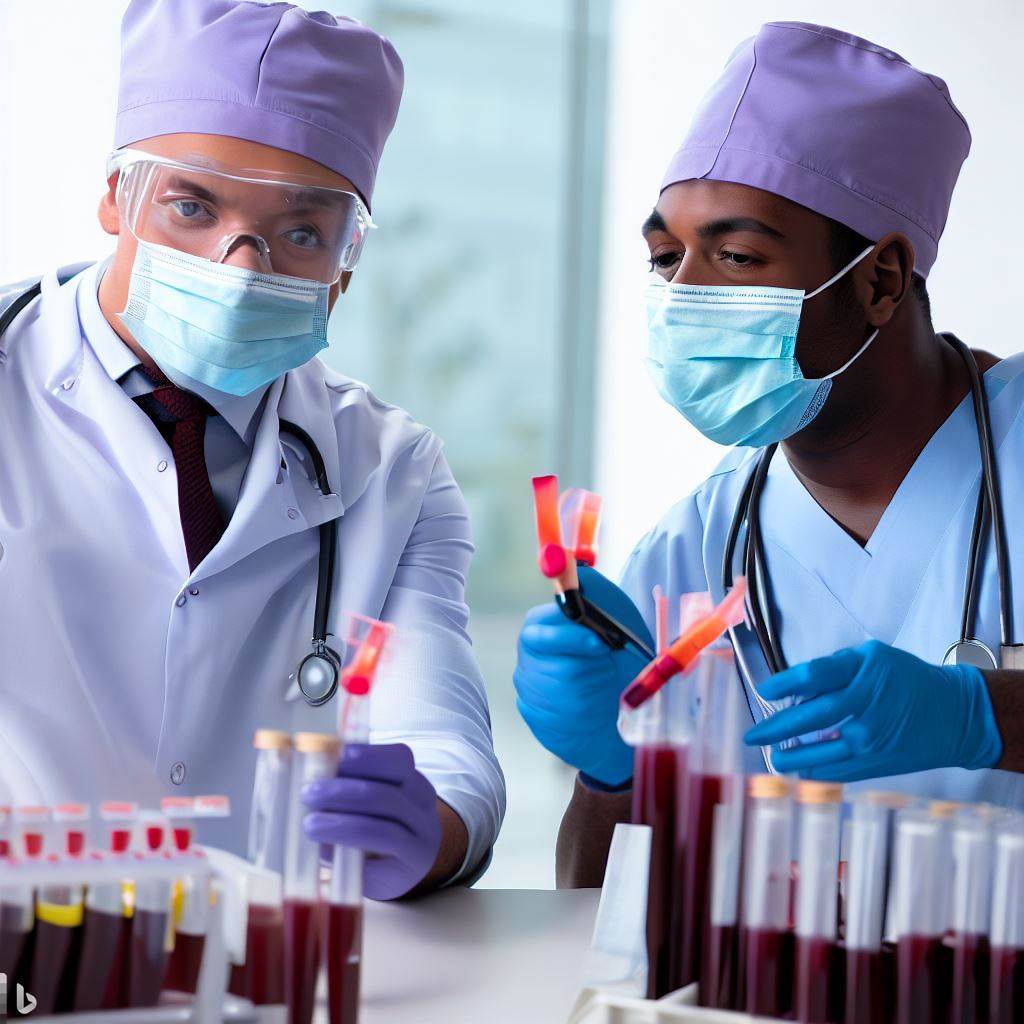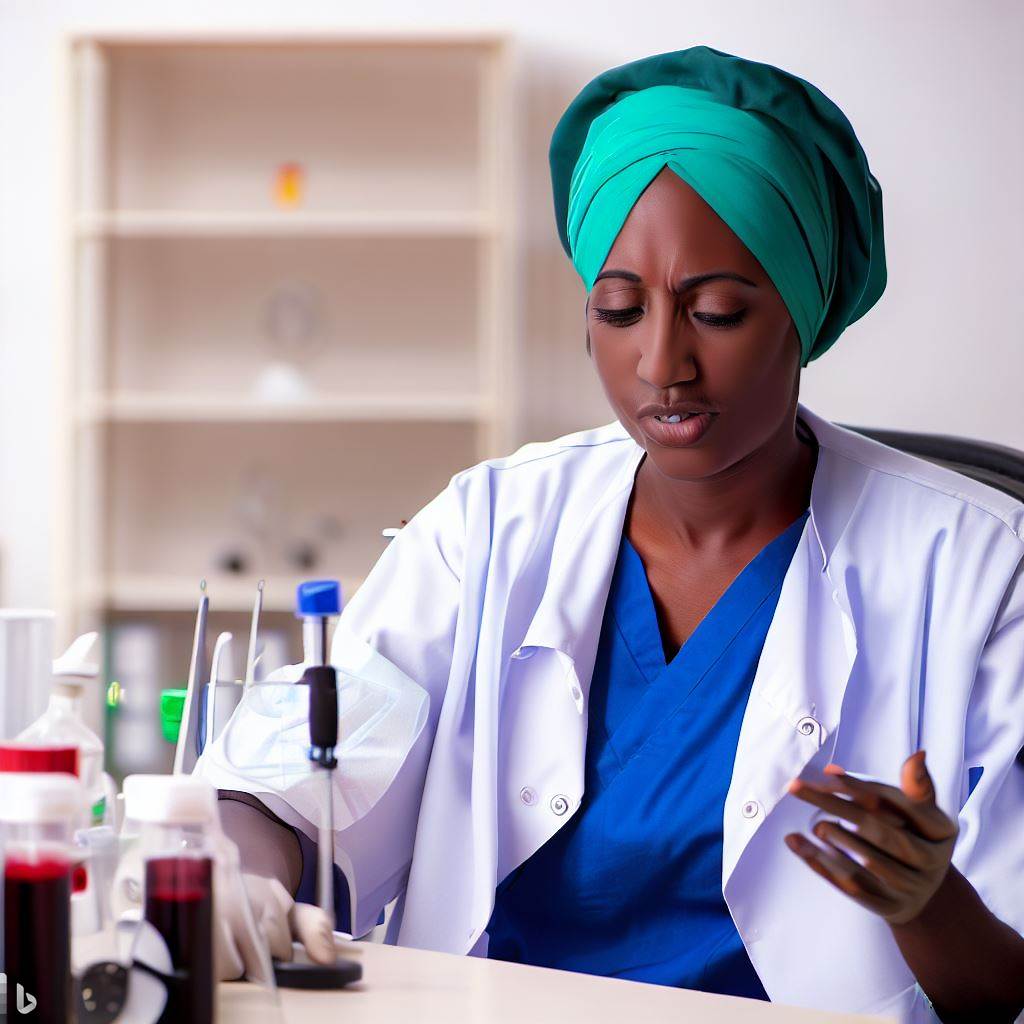Introduction
Phlebotomy plays a crucial role in medical diagnostics, aiding in blood sample collection for testing.
This blog post aims to compare the phlebotomy courses offered in Nigerian medical schools.
Objectives the Blog Post
- Analyze curriculum variations among medical schools.
- Evaluate practical training and hands-on experience.
- Assess faculty expertise and qualifications.
- Consider facilities and equipment provided for training.
- Discuss potential career opportunities post-training.
Let’s dive into the comparative study of phlebotomy courses in Nigerian medical schools!
Overview of Phlebotomy Courses in Nigerian Medical Schools
Understanding the Vital Role of a Phlebotomist
Phlebotomists play a crucial role in healthcare, collecting blood samples for diagnosis and testing.
An Insight into Phlebotomy Courses Offered
- Curriculum and Duration of Courses: Nigerian medical schools offer comprehensive phlebotomy courses covering topics like venipuncture techniques, infection control, and specimen handling.
These courses typically range from six months to one year, allowing students to gain practical skills and theoretical knowledge. - Specific Requirements for Enrollment: To enroll in these courses, aspiring phlebotomists must meet certain prerequisites, including a high school diploma or its equivalent.
Moreover, some institutions may require candidates to have a basic understanding of biology and chemistry.
Phlebotomy courses in Nigerian medical schools equip students with the necessary skills and knowledge to become proficient phlebotomists.
By learning the art of drawing blood accurately and safely, they contribute significantly to the healthcare system, ensuring proper diagnosis and patient care.
These courses’ comprehensive curricula cover topics such as anatomy and physiology, medical terminologies, and laboratory safety protocols, preparing students for real-world challenges.
In addition to classroom lectures, students gain hands-on experience through clinical rotations in hospitals and laboratories.
This practical exposure is essential for building confidence and mastering essential skills in venipuncture, capillary puncture, and specimen processing.
It also hones their communication and interpersonal abilities, crucial for interacting with patients during the procedure.
Before enrolling in these courses, candidates need to fulfill certain prerequisites, ensuring they have the foundational knowledge required for the program.
These may include a high school diploma, proficiency in biology and chemistry, and a genuine interest in healthcare.
By providing comprehensive training and adhering to stringent admission criteria, Nigerian medical schools are shaping skilled phlebotomists who contribute significantly to the healthcare landscape.
Their roles in ensuring accurate diagnostic results and patient well-being make phlebotomy courses invaluable for aspiring healthcare professionals in Nigeria.
Read: Impact of Economic Factors on O&P Practice in Nigeria
Comparison of Phlebotomy Courses from Different Nigerian Medical Schools
In this section, we will compare the phlebotomy courses offered by different Nigerian medical schools.
Each university has a unique approach to teaching phlebotomy techniques, with their own strengths and weaknesses.
Courses Offered in University of Lagos
Starting with the University of Lagos, the curriculum covers various topics such as the introduction to phlebotomy, blood collection techniques, and infection control.
One of the outstanding features of this program is the hands-on training offered at a well-equipped laboratory, allowing students to gain practical skills necessary for the field.
Topics covered in the curriculum include introduction to phlebotomy, blood collection techniques, and infection control.
Unique features of the program include hands-on training at a well-equipped laboratory and emphasis on practical skills.
Analysis of Phlebotomy Courses from Ahmadu Bello University
Curriculum and duration of the program are similar to University of Lagos, covering essential topics in phlebotomy.
Ahmadu Bello University utilizes a diverse range of teaching methods, including lectures, demonstrations, and interactive workshops.
Moving on to Ahmadu Bello University, the curriculum and duration of the program are quite similar to University of Lagos. Both universities cover essential topics in phlebotomy.
However, Ahmadu Bello University stands out with its diverse teaching methods, which include lectures, demonstrations, and interactive workshops.
These methods ensure an engaging learning experience for students.
Evaluation of Courses Offered by University of Ibadan
The program’s curriculum at University of Ibadan is comprehensive, encompassing both theoretical and practical aspects of phlebotomy.
A notable strength of University of Ibadan’s program is the inclusion of specialized courses in advanced phlebotomy techniques.
One weakness of University of Ibadan’s program is the limited availability of clinical training opportunities for students.
Next, let’s evaluate the courses offered by University of Ibadan. The program’s curriculum at University of Ibadan is comprehensive, covering both theoretical and practical aspects of phlebotomy.
It offers specialized courses in advanced phlebotomy techniques, which is a notable strength of the program.
However, a weakness of University of Ibadan’s program is the limited availability of clinical training opportunities for students, which may hinder their practical skill development.
In the end, each Nigerian medical school has its own unique approach to teaching phlebotomy courses.
University of Lagos provides hands-on training, Ahmadu Bello University utilizes diverse teaching methods, and University of Ibadan offers specialized courses.
Students should carefully consider the curriculum, teaching methods, and practical opportunities offered by each university to make an informed decision about their phlebotomy education.
Read: Phlebotomist’s Career Outlook in Nigeria for 2023-2028

Criteria for Choosing the Right Phlebotomy Course in Nigerian Medical Schools
Factors to Consider when Comparing Phlebotomy Courses
- Accreditation of the medical school: Ensure the medical school offering the course is accredited by recognized bodies.
- Teaching methods and resources: Evaluate the teaching methods used and the availability of necessary resources.
- Clinical training opportunities: Look for courses that provide ample opportunities for hands-on clinical training.
- Affordability: Consider the tuition fees and related costs in relation to your budget.
Read: The Journey to Becoming a Registered Nurse in Nigeria
Importance of Considering Personal Goals and Preferences
It is crucial to take into account your personal goals and preferences when deciding on a phlebotomy course.
Your goals may include specific career aspirations or areas of interest within the field of phlebotomy.
Preference for a particular teaching style or learning environment should also be considered.
By aligning your personal goals and preferences, you can maximize your learning experience and satisfaction.
Tips for Gathering More Information about Specific Phlebotomy Courses
- Research online: Utilize the internet to search for information about different phlebotomy courses.
- Read reviews and testimonials: Look for feedback from students who have previously enrolled in the courses.
- Attend open houses or information sessions: These events provide an opportunity to ask questions directly to course coordinators.
- Contact medical schools: Reach out to the medical schools offering phlebotomy courses for detailed information.
- Consult professionals: Seek advice from healthcare professionals or experts in the field of phlebotomy.
Gathering more information will help you make an informed decision and choose the right phlebotomy course.
Read: Understanding the Role of an Optometrist in Nigeria’s Healthcare
Conclusion
This blog explored phlebotomy courses in Nigerian medical schools, focusing on their differences.
Examining and comparing these courses is crucial to identify strengths and areas of improvement.
By making informed choices, aspiring phlebotomists can ensure quality education and enhance their careers.
In a nutshell, the significance of comparing phlebotomy courses cannot be underestimated. It allows students to choose the best program that aligns with their goals and maximizes their learning experience.
Aspiring phlebotomists should carefully assess course curricula, practical training opportunities, faculty expertise, and institutional accreditation when making decisions.
A thorough examination ensures students receive the highest standard of education and are well-prepared for real-world challenges in the medical field.
Remember, a well-chosen phlebotomy course is not only a pathway to success but also a foundation for better patient care and medical advancements in Nigeria.




